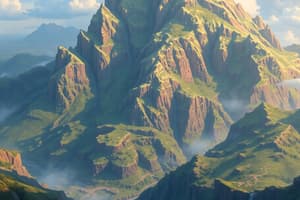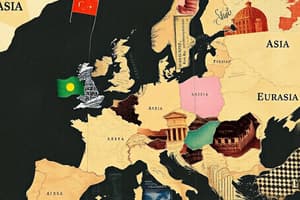Podcast
Questions and Answers
What does the word geography mean?
What does the word geography mean?
The study of the physical features of the Earth and its atmosphere. It also studies human activity as it interacts with the environment, including the distribution of populations and resources and political and economic activities.
What do we study in geography?
What do we study in geography?
We study the physical features of the Earth and its atmosphere, the distribution of populations and resources, and how human activity interacts with the environment.
What were the old tools of a geographer?
What were the old tools of a geographer?
Maps
What are the modern tools of a geographer?
What are the modern tools of a geographer?
Match the following words to the definitions:
Match the following words to the definitions:
Maps appeared as early as the 9th century B.C.E.
Maps appeared as early as the 9th century B.C.E.
Flashcards
What is geography?
What is geography?
The study of the Earth's physical features, atmosphere, and how human activity interacts with its environment.
What is the environment?
What is the environment?
The physical surroundings on Earth, including everything living and non-living.
What are natural resources?
What are natural resources?
Materials existing in nature that can be exploited for profit.
What is livestock?
What is livestock?
Signup and view all the flashcards
What are crops?
What are crops?
Signup and view all the flashcards
What is a habitat?
What is a habitat?
Signup and view all the flashcards
What are maps?
What are maps?
Signup and view all the flashcards
What were the old tools of a geographer?
What were the old tools of a geographer?
Signup and view all the flashcards
What are the modern tools of a geographer?
What are the modern tools of a geographer?
Signup and view all the flashcards
Why do we study geography?
Why do we study geography?
Signup and view all the flashcards
How does geography help us understand human activity?
How does geography help us understand human activity?
Signup and view all the flashcards
How does geography help us understand population distribution?
How does geography help us understand population distribution?
Signup and view all the flashcards
How does geography help us understand resources?
How does geography help us understand resources?
Signup and view all the flashcards
How does geography help us understand political and economic activities?
How does geography help us understand political and economic activities?
Signup and view all the flashcards
Who were the Greek geographers?
Who were the Greek geographers?
Signup and view all the flashcards
What was the Islamic Golden Age?
What was the Islamic Golden Age?
Signup and view all the flashcards
How did geography benefit early explorers?
How did geography benefit early explorers?
Signup and view all the flashcards
What is cartography?
What is cartography?
Signup and view all the flashcards
What is a grid system?
What is a grid system?
Signup and view all the flashcards
What makes a map a projection?
What makes a map a projection?
Signup and view all the flashcards
What is the geographic coordinate system?
What is the geographic coordinate system?
Signup and view all the flashcards
What is latitude?
What is latitude?
Signup and view all the flashcards
What is longitude?
What is longitude?
Signup and view all the flashcards
What is the Equator?
What is the Equator?
Signup and view all the flashcards
What is the Prime Meridian?
What is the Prime Meridian?
Signup and view all the flashcards
What is regional geography?
What is regional geography?
Signup and view all the flashcards
What is human geography?
What is human geography?
Signup and view all the flashcards
What is physical geography?
What is physical geography?
Signup and view all the flashcards
What is geomorphology?
What is geomorphology?
Signup and view all the flashcards
What is climatology?
What is climatology?
Signup and view all the flashcards
What is hydrology?
What is hydrology?
Signup and view all the flashcards
What is pedology?
What is pedology?
Signup and view all the flashcards
What is biogeography?
What is biogeography?
Signup and view all the flashcards
What is zoogeography?
What is zoogeography?
Signup and view all the flashcards
Study Notes
Summary of Geography
- Geography is the study of Earth's physical features, atmosphere, and human activity in relation to its environment, including politics and economics.
- Maps have existed since the 9th century BCE; however, the Greeks developed geography into a scientific field.
- Geography further developed during the Islamic Golden Age and aided navigators during exploration.
- Geography studies patterns, locations, and the functioning of the world to allow responsible decisions regarding humanity's future.
- Geographers utilize various tools, including maps developed since the 9th century BCE and more modern tools like GPS.
Activities: Can you remember?
- Definition of geography
- Subject matter of geography
- The reason to study geography
- Examples of older geographical tools
- Examples of modern geographical tools
Activities: Match the words to the definitions
- Environment: All the physical surroundings on Earth, including every living and non-living entity.
- Livestock: Farm animals that are seen as a resource.
- Natural resources: Materials in nature that can be used for profit
- Habitat: The natural home of plants, animals, and organisms.
- Crops: Cultivated plants like cereals, fruit, or vegetables, grown on a large scale for commercial purposes.
Studying That Suits You
Use AI to generate personalized quizzes and flashcards to suit your learning preferences.




